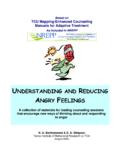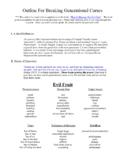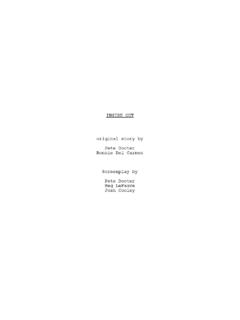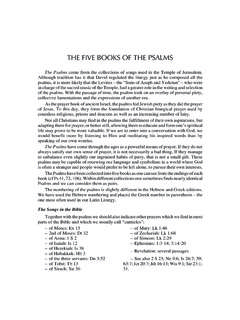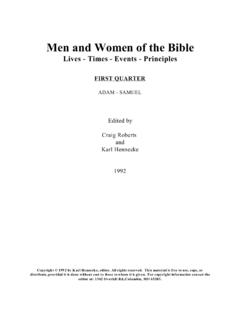Transcription of Page 1 of 5 The Anger Tree
1 Page 1 of 5 The Anger tree Conflict, Faith and Intimacy I was angry with my friend; I told my wrath, my wrath did end. I was angry with my foe; I told it not, my wrath did grow. And I watered it in fears, night and morning with my tears; And I sunned it with smiles, and with soft deceitful wiles. And it grew both day and night, til it bore an apple bright, and my foe beheld it shine, and he knew that it was mine. And into my garden stole, when the night has veiled the pole; in the morning glad I see; my foe outstretched beneath the tree . (William Blake, Songs of Experience) 7 Assumptions About Conflict 1. Conflict is a natural phenomenon and is therefore inevitable. 2. Conflict involves personal values and needs. 3. Conflicts usually emerge as a symptom of a greater problem. 4. Most conflict is not dealt with openly because most people have not been taught effective ways of resolving conflict.
2 5. Conflict provides opportunity for growth in a relationship. 6. Unresolved conflicts interfere with growth and satisfying relationships. 7. Conflict is a process. We don t have to fix the problem; just respond graciously. Paddy and Carole Ducklow 604-921-9542 Page 2 of 5 The Emotional Staircase #1 Trigger Event #2 Hurt / #3 Fear O #4 Anger #5 Bitterness 1. The trigger event can be any circumstance that produces a hurt response in you. It is most often rejection or betrayal in personal relationships. 2. The hurt response is experienced as sadness, tiredness and unhappiness. 3. Fear is the first emotional response following. At the moment of fear, you are worried and anxious over what the hurt means or what it says about you. 4. Anger is the first defence. It projects the hurt onto someone else, not necessarily the person that hurt you.
3 5. Bitterness is not so much an emotion as it is a passionate commitment. It is a series of emotional behaviors to hurt others as you have been hurt. Paddy and Carole Ducklow 604-921-9542 Page 3 of 5 The Poison tree in Ephesians 4:25 - 5:2 Therefore each of you must put off falsehood and speak truthfully to his neighbour, for we are all members of one body. `In your Anger do not sin': Do not let the sun go down while you are still angry, and do not give the devil a foothold. He who has been stealing must steal no longer, but must work, doing something useful with his own hands, that he may have something to share with those in need. Do not let any unwholesome talk come out of your mouths, but only what is helpful for building others up according to their needs, that it may benefit those who listen.
4 And do not grieve the Holy Spirit of God, with whom you were sealed for the day of redemption. Get rid of all bitterness, rage and Anger , brawling and slander, along with every form of malice. Be kind and compassionate to one another, just as in Christ God forgave you. Be imitators of God, therefore, as dearly loved children and live a life of love, just as Christ loved us and gave himself up for us as a fragrant offering and sacrifice to God. Paul's theology of change is realistic and behavioral: first, stop something; second, change the mind about it; third, start something else. This is a reasonable management plan for dealing with even the complexities of Anger and bitterness. According to the bible, Anger is such a negative experience because it is associated with so many other behaviours and emotions: dishonest talk; dismemberment of the unity of the church; inability to take reasonable responsibility for time and the activities within time; theft; destructive and even blasphemous talk; as well as sexual immorality.
5 In summary, Anger appears to be a symptom of an inability to love self and others. However, the greatest reason for thinking of virtually all human manifestations of Anger as sin is because Anger gives the devil opportunity in the believer's life to such a degree that the Holy Spirit is grieved to the point of leaving. Paul's definition of Anger is inclusive and covers areas of emotions, expression, and ongoing behaviour: "bitterness" "rage" " Anger " "brawling" "slander" "malice" Paddy and Carole Ducklow 604-921-9542 Page 4 of 5 The key to handling Anger is forgiveness, not ventilation or expression. This can only be done by imitating what God has done for us in Christ. The good news is that we can copy Someone.
6 And we can mimic forgiveness like much loved kids. It is in this copying behaviour that the Holy Spirit is found. Anger then, is a signal to deal with ourselves rather than deal with someone else. Revenge against others or ourselves is ruled out. Anger is the opportunity of need that leads to Holy Spirit dependence. Self-control is a fruit or evidence of the Spirit's ministry and affection. Self-control relates to controlling your own destiny more than bitterly keeping yourself from doing something (this often leads to more Anger ). Conciliation / Reconciliation Process in Conflict Our first line of defence against unhappiness is refusing to believe that we are the victims of the bad intentions of others. The formula is: Do not blame the trigger. The world is full of triggers; in fact, life is designed like that, so that we will truly practice.
7 We can be grateful for all these triggers, as without them we might never recognize our own unfortunate reactions. Ayya Khema in "Visible Here and Now" #1 Trigger #2 Reaction #3 Abatement (Reactive line producing conflict) #4 Response-Ability (Decisions for resolution) ---------------------------------------- ------- Line of Personal Responsibility ---------------------------------------- ------ Vengeance Step #1 Conciliation Revengeance Step #2 Reconciliation Broken / bitter non-relationship Step #3 Relationship Cold war Outcome A Harmony Reactivity / anticipation of hurt Outcome B Resourcefulness for change Repetition Outcome C Resolution Paddy and Carole Ducklow 604-921-9542 Page 5 of 5 Paddy and Carole Ducklow 604-921-9542 Satisfaction-Expectation Formula A frequent source of Anger is the sense of demand or obligation ("The world must be good to me and on my terms").
8 Such persons feel unloved, unworthy and often angry, and their unrealistic expectations for self and others contribute to diminished self-esteem and increased frustration. Fearful and anxious, such individuals are much more likely to lash out at those who do not give them what they feel is rightly owed. Self-protective strategies develop lest others discover their Anger and punish or reject them. Anger may be disowned but indirectly expressed in cynicism, sarcasm, projection or in explosive episodes. The formula is: S = R E (Satisfaction = Reality divided by Expectations) When there is a 1 to 1 correspondence between expectation and reality, the individual is satisfied. When expectations greatly outweigh reality, dissatisfaction is great. When reality is greater than expectations, the state of surprise exists.
9 The Prayer of St. Francis Lord .. make me an instrument of your peace, Where there is hatred, let me sow love; ..where there is injury, pardon; ..where there is doubt, faith; ..where there is despair, hope; ..where there is darkness, light; ..where there is sadness, joy; O Divine Master, grant that I may not so much seek .. to be consoled as to console; .. to be understood as to understand; .. to be loved as to love. For it is in giving that we receive; .. it is in pardoning that we are pardoned; .. and it is in dying that we are born to eternal life.


